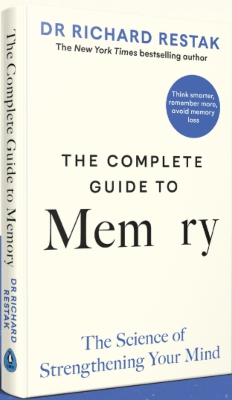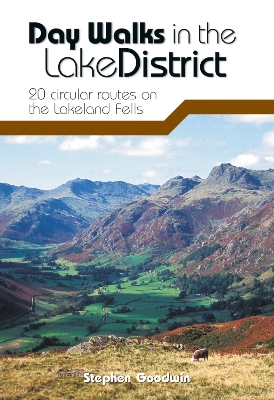Walks Around The Lake District and Coping With Memory Loss are this months book reviews from John Morris.
Many readers, particularly those over 65, may well empathise, and possibly sympathise, with my personal issues of remembering names and wondering where I left my car keys.
An Enthralling Journey
In The Complete Guide to MEM RY, Dr Richard Restak takes us on an enthralling and enlightening journey through the mind. Advising us on thinking smarter and remembering more.
Richard Restak, a renowned neuroscientist, investigates personal health issues such as Alzheimer’s and dementia. He highlights that problems of memory lapses in various formats. Including difficulties with names, places and events, are experienced intermittently by many individuals, with those over 65 particularly vulnerable.
The author takes a comprehensive look at what can go wrong and provides strategies or steps an individual can take to reduce or avoid memory loss.
The book is full of information on the varied nature of recall in terms of “transient memory”, “short-term memory”, procedural or skilled memory”, “future memory” and the all-important “working memory”.
When attempting to stave off problems, the key factor is improving working memory.
Rote Learning Method
The “rote learning” method of teaching practiced within many schools and colleges, even until late in the 20th century. It has been supplanted by the work of Ebbinghaus and others in showing how associate memory is far more effective in promoting recall.
Parents and grandparents of children and young people in schools and colleges will note how current teaching is based on skills of association. Such as thought tracking, mind mapping, highlighting and chunking to strengthen memory and recall.
A major feature of the book is its wide range of tips and tricks to improve working memory. For example, the author highlights the benefits of reading novels as opposed to works of non-fiction. You can “dip in and out” of the latter, whereas reading a novel means you have to “keep track of events”.
Readers may gain from the section on “Memory Method” with the discussion based on creating strategies such as visual similarity. The author highlights the importance of encouraging the brain to work harder using various forms of memory training, including catchphrases, mental images and encoding.

The 3Rs
The more vivid the image created, the greater the chance of recall. I personally adhere to the 3Rs: remember, recall, retain.
However, it isn’t always an easy ride, as discussed at length in the section on “Memory’s 10 Mortal Enemies”. Stumbling blocks lead to lost or distorted memories, such as absent-mindedness, blocking and misattribution.
The section “Smooth Operator to Clumsy Klutz”, highlights the importance of procedural memory and knowing how to do something.
This memory is displayed in activities such as swimming, bike riding, or sawing wood. In this context, he notes the experience of Simone Biles, the outstanding Olympic gymnast, who experienced freezing or choking under pressure. Resulting in an inability to perform routine procedures normally.
The Benefits
A basic tenet of the book is that working memory exercises slow degeneration of the frontal lobes. The author discusses the benefits of:
- Siestas to consolidate memory and the importance of nap time as relaxation.
- Tea and coffee consumption as aids in lowering the incidence of dementia.
- Eating a healthy diet.
- The value of regular exercise to improve blood flow to the whole body and brain.
The key factor is that anything that gets you up and about focuses attention and promotes cognitive resilience.
Andrew Steptoe
Recent research by Andrew Steptoe postdates the publication of Richard Restak’s book. Steptoe (2023) highlights how exercise may stave off dementia but only in combination with sufficient sleep.
Steptoe found that people in their 50s and 60s who did a lot of exercise but got less than 6 hours of sleep experienced rapid cognitive decline over the next 10 years, akin to those who were less active.
This research finding is significant. Therefore, correlating the benefits of physical activity with sleep patterns is important for good cognitive functioning.
For those over 70, the benefits gained from exercise are not dependent on sleep patterns. Keep enjoying walking, running, dancing, swimming, stretching, and lifting weights.
Significantly, with the increasing use of technology such as smartphones and artificial intelligence, the author points to the negative cost of substituting technological memory for human biological memory.
Essential Read
This is clearly linked to verbal communication while spending time with others and reducing physical isolation, which many experienced and endured during Covid.
This outstanding practical insight into how “memory works” provides clear guidance on avoiding or reducing memory loss.
It is an essential read for younger family members to offer effective support to those who need to avoid isolation, strengthen their memory or protect themselves from dementia and think smarter. Well worth reading.
Circular Lake District Walks To Extend Experience and Challenge
Many readers have expressed a desire to extend their awareness of circular walks. Taking them on new experiences and broadening their range of accessible destinations offering magnificent scenery close to their homes.
Day Walks in the Lake District by Stephen Goodwin provides an exhilarating, well-planned range of 20 circular walks in Lakeland Fells. The guide is divided into four geographic sub-sections, with clear details of each hike outlining the challenges walkers will experience.
A key feature of the text is that Stephen Goodwin emphasises all the walks are within the capabilities of “reasonably fit walkers”. All include several areas of ascent.
Each walk summary and route directions are clearly written with key details of distance, total ascent navigation and locality for refreshments. In addition, each circular route is illustrated with a map and illuminating photographs.

Carefully Written Guide
This carefully written guide ensures readers will be aware of any possible hazards, difficult terrain or scrambles that arise. For example, Stephen emphasises only competent scramblers should attempt the ridge scrambles of Striding Edge on Helvellyn and at Sharp Edge on Blencathra.
However, as regular walkers are aware, competence comes with graded experience that builds skills and confidence.
This handbook is really well written and structured. It will encourage and support walkers to enjoy the “buzz of the Lakeland Fells” and extend their experiences.
For more book reviews, click here.


